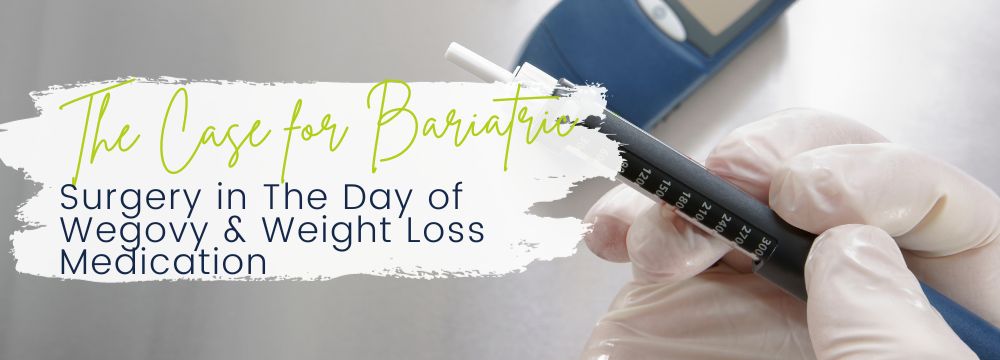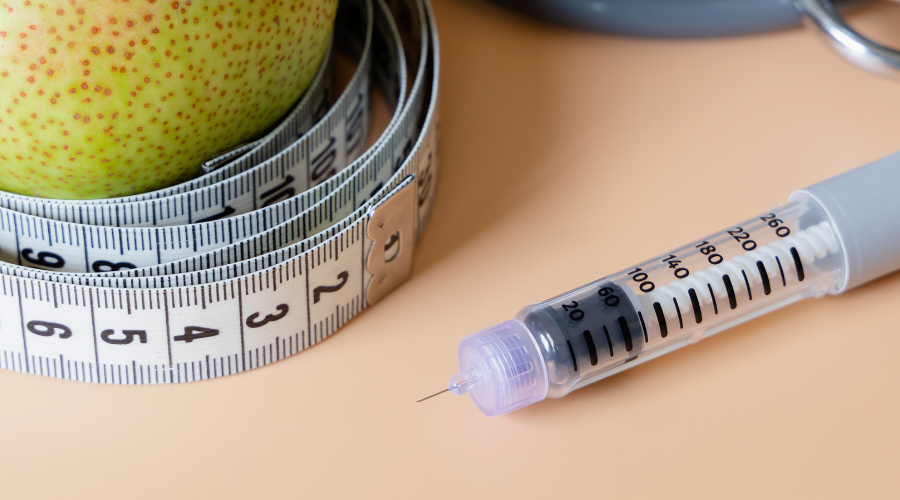
The class of drugs known as GLP-1 receptor agonists like Wegovy and Mounjaro have been held up as possible solutions to the worsening obesity crisis in the United States and around the world. These drugs are incredibly effective in well-selected patients. However, the hype has been such that many patients now believe that medication is all they need to lose their excess weight and hit their weight loss and disease resolution goals. Many patients look for this medication without considering whether they may be better suited to bariatric surgery. With that said, there is an excellent case for bariatric surgery for many patients who are currently taking Wegovy, Mounjaro, or other GLP-1 drugs off-label for weight loss. In this article, we dive into what these medications are and what they are not, where the effectiveness of medication ends, and where the usefulness of bariatric surgery begins.
Weight Loss for Very High BMIs
One of the biggest misconceptions of those taking weight loss medication is that they will allow you to lose all your excess weight. In clinical trials, patients on Wegovy lost an average of 15% of their body weight. From the manufacturer:
- 83% of adults taking Wegovy® lost 5% or more weight, vs 31% on placebo*
- 66% of adults taking Wegovy® lost 10% or more weight, vs 12% on placebo*
- 48% of adults taking Wegovy® lost 15% or more weight, vs 5% on placebo*
- 30% of people taking Wegovy® lost 20% or more weight, vs 2% of people on placebo, in a supportive measure*
*Data taken from https://www.wegovy.com/about-wegovy/weight-loss-with-wegovy.html
However, for those with a very significant amount of weight to lose – generally speaking, a BMI of 40 or more may not be enough to get back to a healthy weight. Consider a 5’4” patient at 250 pounds (43 BMI). For example, their goal weight may be 160-174 pounds (27.5-29.9 BMI). Losing 20% of their body weight on meds would get them down to 200 pounds, still considered obese (34 BMI). They could continue to experience significant comorbidities as a result.
The Cost
No doubt, bariatric surgery is a costly proposition. But with the cost of GLP-1 receptor agonists hitting upwards of $1000 per month when not covered by insurance, we can see that the breakeven point is at about nine to 12 months, depending on the cash pay rate. However, the difference is that bariatric surgery continues to work even after this point, whereas the GLP–1 medication will cease to have its appetite-suppressant effect soon after it is discontinued. As such, some patients on these medications over the long term may incur significantly greater costs for potentially lower overall weight loss.
Long-term Risks
The gastric sleeve is a relatively safe procedure with a major risk profile around that of simple gallbladder removal. While it’s true that GLP–1 receptor agonist medication has a low-risk profile, some patients have experienced severe gastrointestinal issues like vomiting, diarrhea, constipation, and nausea. Others have experienced gallbladder and pancreas concerns that can be serious. Some patients are complaining of stomach motility issues like gastroparesis. This is essentially the paralysis of the stomach, which does not allow food to pass through to the small intestine normally and efficiently.
Lastly, Can Weight Loss Drugs Work With Bariatric Surgery?
While it may seem like there is little reason to consider weight loss medication above a certain BMI, this is not the case. Weight loss medications can enhance the continuum of care alongside bariatric surgery. Why? First, weight loss medication plays a role preoperatively in helping patients lose weight and shrink their liver, allowing bariatric surgery to be safer and allowing the surgeon better access to the surgical field. Weight loss medication may also play a role post-surgical when patients try to lose weight and reach their goals. The patient may be able to either stay on track or get back on track in the postoperative process, ensuring their weight loss is as safe and effective as possible.
Ultimately, this class of drugs offers exciting opportunities for patients needing to lose a significant amount of weight. We encourage anyone who needs to lose anyone with a BMI over 30 or 35 to consider the full range of weight loss options, including medication and surgery. By visiting us and discussing these options, you can get the best idea of what will work for you and what to expect.


